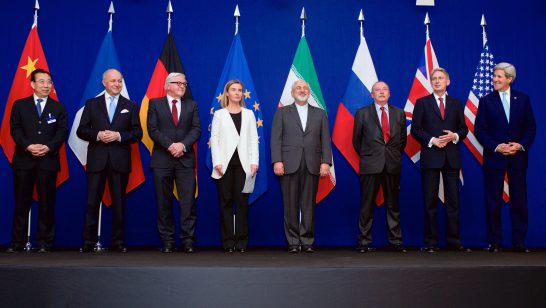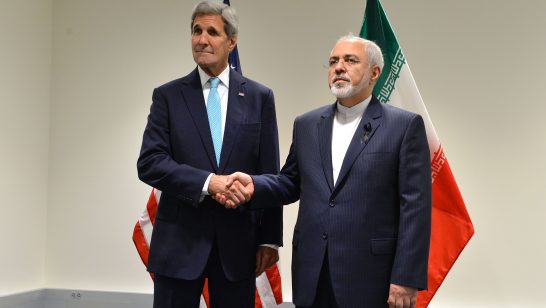
After a months-long review process, the White House finally published its new strategy on Iran last Friday. Shortly afterwards, US president Donald Trump delivered a speech where he, as expected, claimed that Tehran had violated both the letter and the spirit of the multilateral agreement over its nuclear programme, the “Joint Comprehensive Plan of Action” (JCPoA). While he formally stuck to the JCPoA, he urged Congress to “fix” the flaws of it as he sees them. Otherwise he would withdraw from it in due course, using his executive powers.
From a broader perspective, the US administration’s new Iran policy is designed to comprehensively counter Iran’s influence in the Middle East, a goal that is widely shared among decision-makers in Washington. Trump’s announcements thus raise some crucial questions that Europeans will have to address and that go far beyond the atomic dossier. Which Iran-policy do EU member states, not least France, Great Britain and Germany, wish to pursue and how are they going to deal with a US-policy that is based on confrontation vis-a-vis Tehran?
The nuclear deal with Iran and the wars in Syria and Yemen are enmeshed with domestic power struggles in and around the Persian Gulf. Moreover, the emergence of these and other “battle fields” where Iran and Arab Gulf states, chief among them Saudi-Arabia, fight for regional dominance have increasingly blurred the lines between counter-terrorism, the oppression of political opponents, and more traditional interstate rivalry. For instance, the Houthis in Yemen have fired rockets both onto Saudi territory and towards US warships thus posing a military threat to Riyadh as well as to the American navy. However, whether they should be labelled “terrorists” or instead ought to be seen as a party to a domestic power struggle is a political judgment.
The outline of Trump’s Iran-policy indicates that the United States will most likely be drawn closer into these battles. Earlier in 2017, the Trump administration signalled its willingness to step-up its support for the Saudi-led military campaign against the Houthis in Yemen. Unlike Obama, President Trump adopted the viewpoint that Yemen is a key location to confront Iran and its proxies. (1) At the same time, Trump has so far not demonstrated much interest in diplomatically contributing to ending the war in Yemen.
Other conflicts in the Persian Gulf, which have almost been forgotten today, might also be rekindled. In 2011, Saudi Arabia and the United Arab Emirates sent military and police forces to Bahrain to contain and defeat an uprising of mostly Shiite opposition groups against the Sunni monarchy. As the Shia population is the majority, the small Gulf state is a prime arena for Saudi-Iranian contest via “proxies”. Six years ago, Washington refrained from direct political or even military interventions in Bahrain. It is quite possible that Trump would intervene much more forcefully in support of Riyadh should tensions flare up again. The EU and its member states will therefore have to know how position themselves to address further regional conflicts in the Middle East.
America’s new Iran policy also raises the issue of where to focus the common fight against terrorism. In September 2014 Obama initiated a global coalition against the “Islamic State” – which also includes all of the six countries of the Gulf Cooperation Council, and which Trump continues to rely upon. The new Iran strategy is based on the explicit assumption that Washington has for the past 15 years focussed too much on Sunni extremist organizations and needs to more aggressively target Iranian Shia proxies.
This is very much aligned with Saudi Arabia’s perspective. Riyadh has long advocated broadening the scope of the fight against terrorism. In December 2015 it launched its own initiative with this in mind, namely the “Islamic Military Alliance”. Whilst also tackling IS, it was meant to target any group or militia that threatens the alliance’s members. The EU and its member countries need to be clear that they do not wish to be drawn into the proxy battles between Saudi Arabia and Iran and will have to stay focused on tackling Al-Qaida and IS. These are the most central and immediate terrorism threats to both Europe and the United States.
EU’s strong interest in keeping the JCPoA afloat will increase pressure on the Europeans to align more closely with the US on the non-nuclear policy aspects. Most immediately, as Trump already stated, Washington will pressure allies to strengthen economic sanctions that are outside the scope of the nuclear agreement. The US Congress has followed this path and American policymakers have announced that they want to further increase economic pressure on Tehran. The EU must now decide to what extent it is willing and able to follow suit.
There is consensus within the EU that channels of dialogue must be kept open, including with Iran, to deal with the war in Syria. A US-policy that is exclusively based on isolating Iran will not be supported by most European allies.
So far it is not yet clear how the Trump Administration’s Iran-strategy will be translated into concrete policy and changes in military posture. For France, Great Britain, Germany and other interested EU states, the announcement of the strategy is a turning point which will force them to address regional implications which go beyond the nuclear agreement.
(1) Obama however sent Special Forces and armed drones to fight Al-Qaida and supported the Saudis with weapons, logistics and intelligence.
The opinions articulated above represent the views of the author(s), and do not necessarily reflect the position of the European Leadership Network or any of its members. The ELN’s aim is to encourage debates that will help develop Europe’s capacity to address the pressing foreign, defence, and security challenges of our time.



